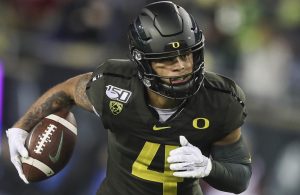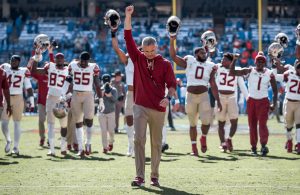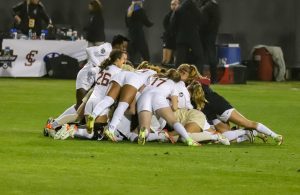- Sunday Seminole Summary: FSU Football Adds Pair of WR Transfers
- Sunday Seminole Summary: FSU Football Exits ESD With Top-15 Class
- Sunday Seminole Summary: FSU Soccer Tops BYU for Third National Championship
- Sunday Seminole Summary: FSU Soccer Advances to National Championship Match
- Seminole Sunday Summary: FSU Soccer Heads Back to College Cup
- Seminole Sunday Summary: FSU Soccer Reaches Sweet 16; Football Tops Boston College
- Seminole Sunday Summary: FSU Soccer Wins ACC, Advances to Second Round of NCAA Tournament; FSU Football Rallies Past Miami
- Seminole Sunday Summary: FSU Soccer Tops Wake on OT to Advance to ACC Final
- Seminole Sunday Summary: FSU Football Crushes UMass for Third Straight Win
- Seminole Sunday Summary: FSU Soccer Stays Perfect with Pair of Wins
Former Noles in Coaching See Glimpses of FSU Coaches in Themselves
 Photo Courtesy of BobbyBowden.com
Photo Courtesy of BobbyBowden.comMost successful people in any profession have others who helped them along the way — whether it be teaching the trade, providing moral or verbal support or just sticking with them through rough times.
Through the years, Florida State has had no shortage of football players go on to have successful careers — some in football and for others, in something else. For many, it happens in both.
Over the years, FSU has had no shortage of great coaches from Bill Peterson, who coached the Seminoles to their first ranked finish to the legendary Bobby Bowden, who won a pair of national championships and put together a 14-year streak unlikely to paralleled to Jimbo Fisher, who won a national title and averaged better than 10 wins per season. FSU fans hope new head man Willie Taggart can continue the tradition of success.
But for every great head coach, there are great assistants who helped mold and develop players and sometimes, even coaches. We spoke with five former Florida State players who have gone on to coach football about which of their former coaches in Tallahassee had the biggest impact on them and who they see in themselves.
“I was probably Odell (Haggins),” said Travis Johnson, who coached at Peal River Junior College in Mississippi. “Actually, I was all the way Odell from being hands-on to the way you deal with the kids. Outside of my father, he was the biggest male figure who had an impact on my life.”
Johnson, who played defensive tackle at FSU from 2000-04 before spending six years in the NFL, said he was ecstatic that Haggins was retained as defensive tackles coach by Taggart. The longest tenured coach, even on Jimbo Fisher’s staff, Haggins had been at FSU since 1994.

Odell Haggins shakes hands with FSU president John Thrasher in his first game as interim head coach against Louisiana-Monroe on Dec. 2, 2017. (Jeremy Esbrandt/FSU athletics)
“Odell was always very approachable,” Johnson said. “They had no choice; you look at the history of Florida State and he’s the only one connected to the past. When Odell retires, maybe I’ll try to coach.”
Johnson only spent one season coaching the defensive line and serving as associate head coach at the junior college in 2014. Johnson has put time aside to spend with his family and children and has coached their baseball and YMCA basketball teams, but said that can be like “herding cats”. Football on the other hand, was quite time-consuming.
“You don’t realize how much strain coaching puts on you and the family,” Johnson said. “Today’s recruiting is so much different than yesterday’s recruiting. It’s constant. That’s on top of coaching the guys you already have.”
For a trio of former defensive backs who have gone into coaching, the answer as to who reminded them of themselves was easy — the legendary Mickey Andrews. Andrews served as FSU defensive coordinator for 26 years from 1984-2009.
“I try to bring the best out of my guys,” said Leroy Smith, who is entering his second year as head coach at Jefferson County School. “Coach Andrews always taught us that accountability was the best ability. You can be the best athlete of the field, but if I can’t trust you, you’re not going to be able to reach your full potential. He had us strive for perfection. I took that from the football field to everyday life.”
Smith played cornerback from the Seminoles from 2000-04. After a brief stint as a professional, Smith began coaching at Maclay High School in 2009 before coming to Shanks Middle School in 2011. Smith said he recalled Andrews having him run in practice for a 2004 interception return for a touchdown against Clemson because he didn’t do his assignment as coached.
“He demanded your absolute best every day — your best effort, your mental toughness,” said former safety Kyler Hall, who is head coach at his alma mater of Suwannee High School in Live Oak. “When we’d say ‘my bad’, Mickey Andrews would say ‘I don’t want your bad, I want your best’. He wanted to bring out the best in you. Once practice was over and you were in the dining hall, he’d come up and hug your neck and really pick you up.”
Hall has spent 11 years coaching at Leon High School under another former FSU safety in Bill Ragans and Maclay High School before returning home to Suwannee. This will be Hall’s second season at his alma mater.
“You see things differently when you’re coaching,” said Hall, who played at FSU from 2001-05. “It slows down. When I got hurt (at FSU), I was able to step back and see things from a different vantage point. I think that really helped me a lot.”
Corey Fuller, who played cornerback for FSU from 1990-94 is entering his second season as head coach at Godby High School in Tallahassee and has been coaching for 10 years since retiring in 2004 after 10 years in the NFL. Fuller said he initially got into coaching to volunteer his time and considers it more of a calling than a job.
“I see a Mickey Andrews-style philosophy in myself,” Fuller said. “I’ve just tried to instill discipline. When I got to Florida State, they took a boy and turned me into a man. For a kid that came from a broken home, they helped turned me into the man that I am today. I’ve just tried to pay it forward.”

Coach Mickey Andrews spent 26 seasons as defensive coordinator at Florida State. (FSU athletics)
While known for his tough, no-nonsense demeanor, Smith and Hall said it wasn’t hard to figure out that Andrews cared about them. The lasting lessons from Andrews, according to Smith, was not to cheat on plays, how to prepare, work ethic and being willing to compete.
“If you do things the right way, good things will happen and you won’t have to rely on luck,” Smith said. “A lot of us didn’t realize how great he was until he left Florida State. He was different on and off the field. You see him on the field and you’d think he was the toughest, meanest coach God ever put on this earth — and he was. There was a reason why Coach Andrews was great and we were great. He prepared us for excellence.”
Hall said he still thinks about his former coordinator and position coach quite often.
“There’s so many things about Coach Andrews that sticks with me,” Hall said. “There was a never a time where he wasn’t prepared or didn’t know what he wanted to do. He demanded your best and he demanded you demand the best of yourself. He got you to be so tough mentally that the physical things didn’t seem to matter. That’s probably why he coached so many great players.”
Although Smith and Johnson each saw their former position coaches in themselves, Smith noted that he also saw a little bit of Haggins in himself in the way that he was a player’s coach. For Johnson, he noticed a bit of Andrews would come out from time to time.
“At times, I had a little bit of Mickey in me,” Johnson said. “He didn’t mince words, but Mickey did it because he cared about you.”
Unlike Johnson and Fuller, who enjoyed long careers in the NFL, FSU’s first Heisman Trophy winner and former quarterback Charlie Ward spent 11 years in the NBA. Since retiring however, Ward has coached both sports he played for the Seminoles — football and basketball. Ward has spent 11 years coaching football and just completed his fiourth as head coach of Booker T. Washington in Pensacola. The FSU coaches Ward sees in himself are the legendary Bowden, former quarterbacks coach Mark Richt and former wide receivers coach John Eason.
“All those guys were instrumental in me,” Ward said. “My dad (Charlie Ward, Sr.) was my high school coach and I have a lot of him in me as well. I was around it a lot growing up, so some of it was inherited.”
As a head coach at the high school level, Ward said he’s taken pieces from each of the aforementioned FSU coaches and implemented them into his life as a coach. After Ward struggled early during the 1992 season as a starter, Bowden’s Seminoles shifted to a style that better suited the future Heisman winner and national champion’s skill-set, which came to be known as the “Fast Break Offense”.
“You have to be willing to adapt,” Ward said. “Coach Bowden was willing to change what he was used to doing. I admired that he was willing to sacrifice that for my success.
“Coach Bowden was more of the CEO/manager who allowed his coaches to coach,” Ward said. “We wasn’t a micro-manager, but he wasn’t afraid to share his thoughts. Coach Bowden was also a very good Christian man.”
One of the things Smith said he learned from Bowden was to keep great assistants.
Later the offensive coordinator for Florida State and currently the head coach of Miami, Richt was Ward’s position coach for his final four seasons.
“Coach Richt was the same way — very mild-mannered,” Ward said. “Very rarely did he yell and that played into my understanding. I didn’t like yelling; I’d just tune that out. He was a great Christian man, who showed you can be a great coach and still value your family.”
Although Ward never played receiver, he said Eason looked after him with a lens that went beyond the gridiron.
“John Eason looked after me and made sure I was doing well academically,” Ward said. “He really took care of me. Coach Eason made sure I got absolutely everything I needed from an academic standpoint and an emotional standpoint as well.”
Mike Ferguson is the editor of The Daily Nole. Follow Mike on Twitter @MikeWFerguson
Related Posts
One Comment
You must be logged in to post a comment Login
Leave a Reply
Cancel reply
You must be logged in to post a comment.
About Mike Ferguson
Mike Ferguson is the editor of The Daily Nole and former editor of Noled Out. Mike has more than seven years experience as a sports writer including the last four in print and online media. Mike graduated from Florida State University in 2009 with a Bachelors in Religion and a minor in Communications. Mike provided press coverage of Florida State's run to the 2013 BCS National Championship. Mike is also a news reporter at Polk County's newspaper, The Ledger in Lakeland, Florida. and contributes to Athlon Sports and ACCSports.com. Mike has been featured on sites as prominent as Yahoo Sports, FoxSports.com, Associated Press and the front page of SI.com while interviewing athletes as high profile as 2013 National League MVP, Andrew McCutchen. Email Mike at Mike@TheDailyNole.com. Follow Mike on Twitter @MikeWFerguson.




Pingback: Remembering Bobby Bowden: A Compilation From Former Players - Part II - Fifth Quarter